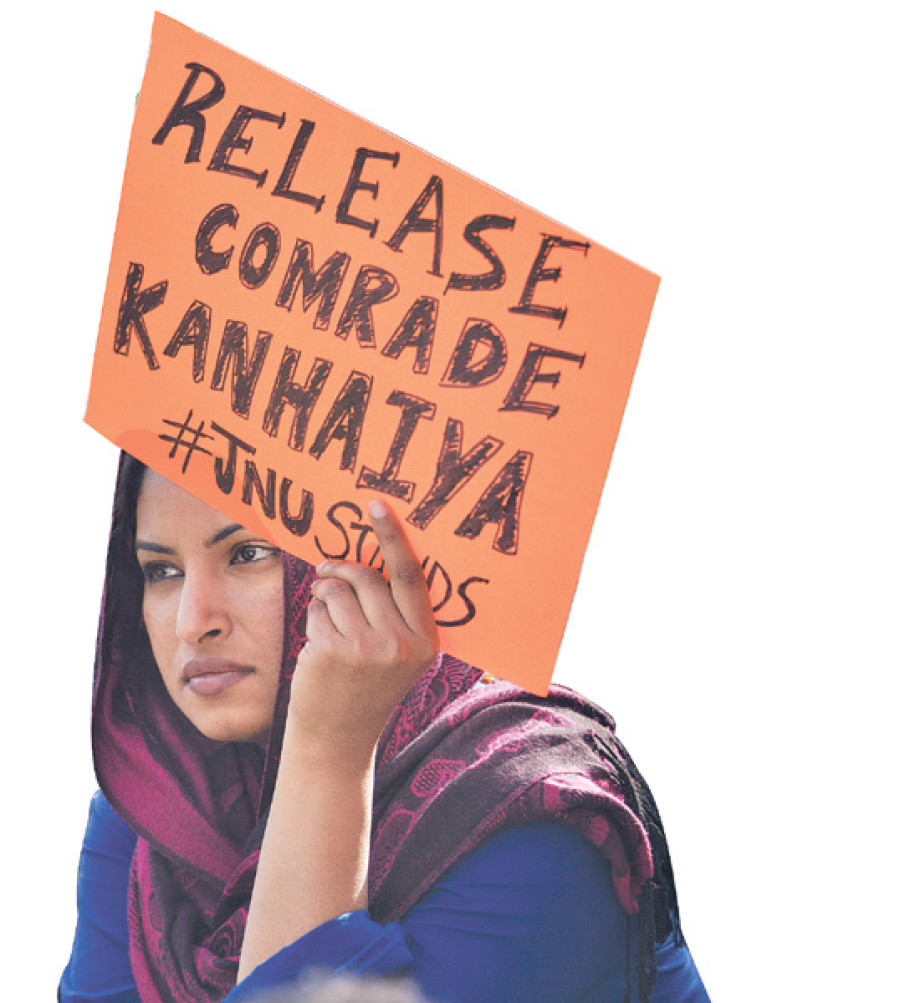Miscellaneous
Four legs good, two legs bad
Hindu nationalism and its dangers for Nepal
Shreya Paudel
Patriotism cannot be our final spiritual shelter; my refuge is humanity. I will not buy glass for the price of diamonds, and I will never allow patriotism to triumph over humanity as long as I live. ”– Rabindranath Tagore
In the past several days, the main news of the day for me has been coming from our neighbour’s capital, Delhi where the Jawaharlal Nehru University (JNU) Students’ Union president, Kanhaiya Kumar, has been arrested by the police on charges of ‘sedition’. I watched, and re-watched, the purportedly incriminating speech on YouTube and have struggled to pin down anything against India as such. To many like me, he did not sound anti-national in his speech, what he did talk against was the insidiously growing Hindu nationalism of the Bharatiya Janta Party (BJP) and its subsidiary organisations. Without pondering in the details of the events that followed the arrest, it appears to me that the BJP cadres have attempted to silence dissent in the very capital of the, loudly flaunted, biggest democracy in the world .
Now, why should secularist Nepalis be concerned about the BJP and its outfits? For the simplest reason that a large number of the political movements of Nepal have been directly or tangentially influenced from similar movements in India. Be it the Nepali Congress, the Marxist-Leninist (now UML) or the Maoists; some of the biggest political movements in the country all have had experiences of being ideologically and operationally inspired by similar movements by the Indian National Congress and Indian communist movements thereafter. If history is taken as a witness, it would not be an exaggeration to say that the current strain of Hindu fundamentalism can spill over into Nepal as well. At least for now, Nepal, thankfully, is not in a situation where a religious sectarian party can stake a claim to the reins of power. Of course, there is the Rastriya Prajatantra Party (Nepal) but it is nowhere near BJP in terms of power, aggression and grassroots activism. However, we need be vigilant of the possible influences in Nepal from BJP outfits.
Nationalism is a double edged sword which can sometimes work revolutionarily against imperialism and at other times it can itself become an instrument of oppression against minorities and dissenters. When the idea of Indian independence was flowering in the 1920s and the 1930s, the then nationalism was a liberating notion against the yolks of British occupation. For freedom loving people, that anti-imperialist nationalism is always welcome. However, if nationalism marries a religious fundamentalism and starts silencing other religions and dissenters, it becomes an oppressive force. If nationalism defines what ‘national’ and ‘anti-national’ are, then it is bound to create divisions among people. Furthermore, if the oppressive force is supported by a vast majority of the population like how BJP is currently in India, it gives life to Tocqueville’s phrase, “tyranny of the majority.” This is not to say that the majority of Indians who voted BJP are oppressive, however, the ideology of the party they voted for is certainly divisive.
I find it staggering that people can organise as nationalists around a diverse construction such as Hinduism. Taken to its liberal limits, Hinduism allows every kind of thought and lifestyle to co-exist together. From Shiva with his ashes and marijuana to Vishnu with ‘saatvik’ aristocratic features; from the empowering Durga to Bahuchara Mata, a deity goddess for transsexuals; From countless interpretations of the concept of God to even a space provided to atheism. Arguably the ultimate liberal line of Hindu teaching is Vasudaiva Kutumbakam in the Maha Upanishad, which means that the whole world is a family.
But the problem is that the Hindu nationalists have come up with their own stringent interpretations. Taken to the extremes, many scholars and writers have attributed the Hindu-Muslim riots in Gujrat in 2002 to Hindu nationalist organisations including the BJP. If a person as popular as Aamir Khan calls out the ‘intolerant’ environment in his country, the response he has received from the Hindu nationalists is to “go back to Pakistan”. Top leaders of BJP, like Amit Shah, have gone on to incite anti-Muslim rhetoric in their speeches. For us as Nepalis, you just have to go to Rastriya Swayam Sevak Sangh’s (RSS) website to have a quick glance of their interpretation of political Hinduism’s geopolitics. Amongst other things in their website, ‘Akhanda Bharat’ (greater India) contains the whole of South Asia including Nepal and extends to Myanmar. It is just this extreme Hindu nationalist rhetoric and its emergence in politics, speeches, hatred, riots, Hindu-Indian exceptionalism and hence potentially in policies as well, that make this brand of nationalism so dangerous not just to India but to Nepal as well.
Like India, Nepal also has its share of emerging nationalism around single identities. Daura-suruwal-patuka, khukuri, and gunyu cholo have been constructed as what ultimate Nepaliness is. The ethnic mobilisations in Nepal are seeking to revise and rephrase Nepaliness in order to establish a plurality of meanings in the Nepali identity. Nevertheless, for the larger part we have not organised politically around a religion. Nepal has a long standing history of letting different religions, cultures and ideologies to coexist amicably, let us continue this proud tradition and not be tempted to create rifts between fellow Nepalis. We already have enough ethno-linguistic divisions as it is, let’s hope that they will not been entrenched further by adding religion into the mix.




 7.12°C Kathmandu
7.12°C Kathmandu










